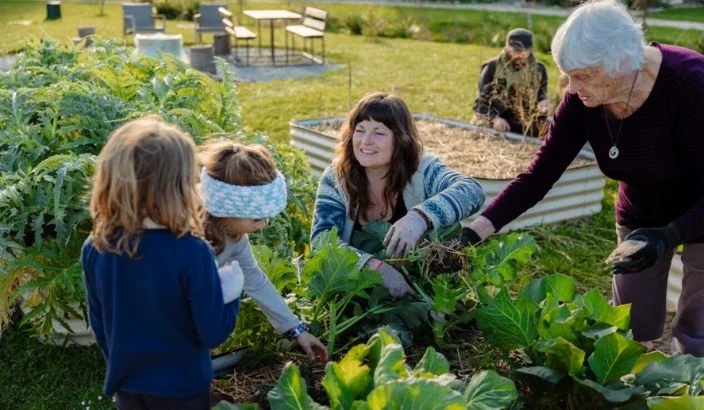Exploring alternatives to ‘one-size-fits-all’ housing

As a founding member of the Tākaka cohousing neighbourhood, Simone Woodland knows first-hand the benefits of circle living and will speak about her experience at the upcoming Women Revolutionising Housing event this week. Photo: Supplied.
“It’s like having a really big family that we are connected to.”
Simone Woodland is one of several speakers at an upcoming Women Revolutionising Housing Hui, which will explore different housing models.
Simone is a co-founder of Tākaka Cohousing and a member of Circle Living, described as “a people-focused property company building connected, intergenerational neighbourhoods”.
She and her family have been members of such a neighbourhood in Golden Bay for more than two years, and she says that while everyone owns their own homes, the structure allows for shared space and facilities, including a “common house” for gatherings and celebrations, a workshop and community gardens, as well as a central “beautiful park-like space”.
Cars are parked on the outside of the neighbourhood for serenity and safety, and the houses are arranged in a loose circular footprint to encourage connection.
“You can interact as much as you want to,” Simone says, explaining that it is a great set-up for extroverts and introverts alike due to the micro-connections residents have while walking from their cars to their houses, for example.
The not-for-profit hui will discuss collective housing, such as cohousing, ecovillages and tiny home village models.
There will also be kōrero around housing affordability, exploring different finance and ownership structures, as well as legal and partnership strategies to enable alternative housing pathways.
Event coordinator Zola Rose says our current housing system, while serving some, still fails many.
“Homes are increasingly unaffordable, leaving residents house-poor and unable to fully participate in the local economy or community life,” she says.
“A lack of diverse housing options, a ‘one-size-fits-all’ model, leaves out single people, low-income workers, and older residents wanting to downsize.”
She explains that the Women Revolutionising Housing Hui is a women-only event because they bring “a different and deeply needed perspective to how housing is imagined and developed” in what is a largely male-led and profit-driven sector.
“In contrast, women tend to think more holistically, seeing housing as the foundation for wellbeing, connection, and community life,” she says.
The three-day hui will run from Thursday 6 to Saturday 8 November at Lower Moutere’s Riverside. While the overarching event is for women, all are welcome at Friday’s Housing Futures Forum.
For further information and to book, contact www.commonground.net.nz/women-revolutionising-housing-hui-2025.
